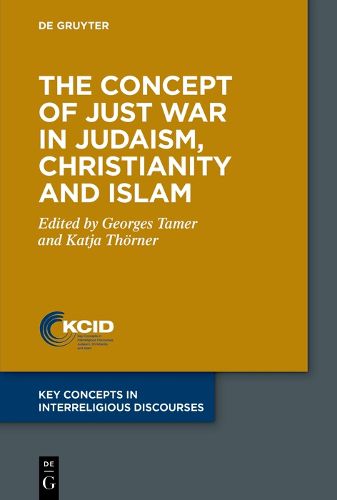Readings Newsletter
Become a Readings Member to make your shopping experience even easier.
Sign in or sign up for free!
You’re not far away from qualifying for FREE standard shipping within Australia
You’ve qualified for FREE standard shipping within Australia
The cart is loading…






This title is printed to order. This book may have been self-published. If so, we cannot guarantee the quality of the content. In the main most books will have gone through the editing process however some may not. We therefore suggest that you be aware of this before ordering this book. If in doubt check either the author or publisher’s details as we are unable to accept any returns unless they are faulty. Please contact us if you have any questions.
For Jews, Christians and Muslims, as for all human beings, military conflicts and war remain part of the reality of the world. The authoritative writings of Judaism, Christianity and Islam, namely the Hebrew Bible, the New Testament and the Koran, as well as the theological and philosophical traditions based on them, bear witness to this fact. Showing the influence of different historical political situations, various views - sometimes quite similar, sometimes more divergent – have developed in the three religions to justify the waging of war under certain circumstances. Such views have also been integrated in different ways into legal systems while, in certain cases, theologies have provide legitimation for military expansion and atrocities.
The aim of the volume The Concept of Just War in Judaism, Christianity and Islam is to explore the respective understanding of just war in each one of these three religions and to make their commonalities and differences discursively visible. In addition, it highlights and explains the significance of the topic to the present time. Can the concepts developed in the Jewish, Christian and Islamic traditions in order to justify war, serve as a foundation for contemporary peace ethics? Or do religious arguments always add fuel to the fire in armed conflict? The contributions in this volume will help provide answers to these and other socially and politically relevant questions.
$9.00 standard shipping within Australia
FREE standard shipping within Australia for orders over $100.00
Express & International shipping calculated at checkout
This title is printed to order. This book may have been self-published. If so, we cannot guarantee the quality of the content. In the main most books will have gone through the editing process however some may not. We therefore suggest that you be aware of this before ordering this book. If in doubt check either the author or publisher’s details as we are unable to accept any returns unless they are faulty. Please contact us if you have any questions.
For Jews, Christians and Muslims, as for all human beings, military conflicts and war remain part of the reality of the world. The authoritative writings of Judaism, Christianity and Islam, namely the Hebrew Bible, the New Testament and the Koran, as well as the theological and philosophical traditions based on them, bear witness to this fact. Showing the influence of different historical political situations, various views - sometimes quite similar, sometimes more divergent – have developed in the three religions to justify the waging of war under certain circumstances. Such views have also been integrated in different ways into legal systems while, in certain cases, theologies have provide legitimation for military expansion and atrocities.
The aim of the volume The Concept of Just War in Judaism, Christianity and Islam is to explore the respective understanding of just war in each one of these three religions and to make their commonalities and differences discursively visible. In addition, it highlights and explains the significance of the topic to the present time. Can the concepts developed in the Jewish, Christian and Islamic traditions in order to justify war, serve as a foundation for contemporary peace ethics? Or do religious arguments always add fuel to the fire in armed conflict? The contributions in this volume will help provide answers to these and other socially and politically relevant questions.